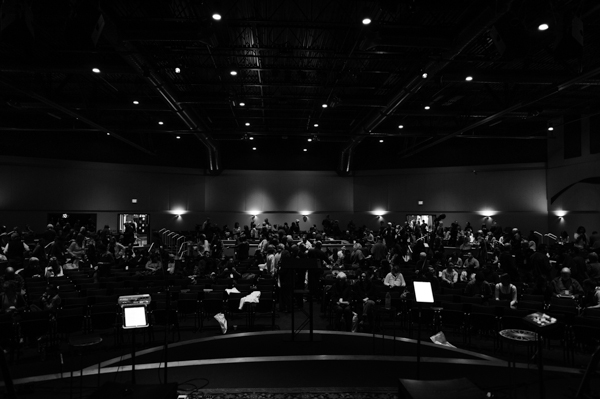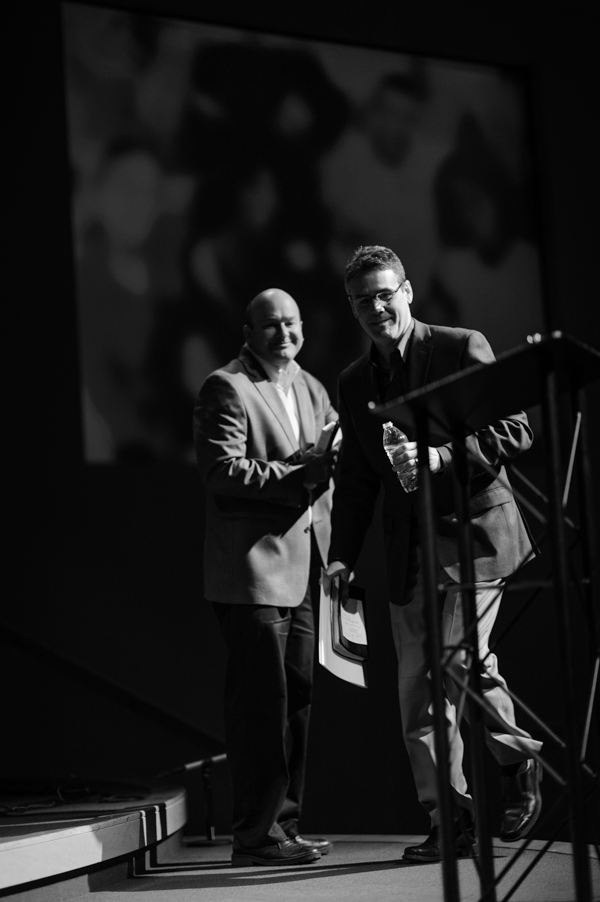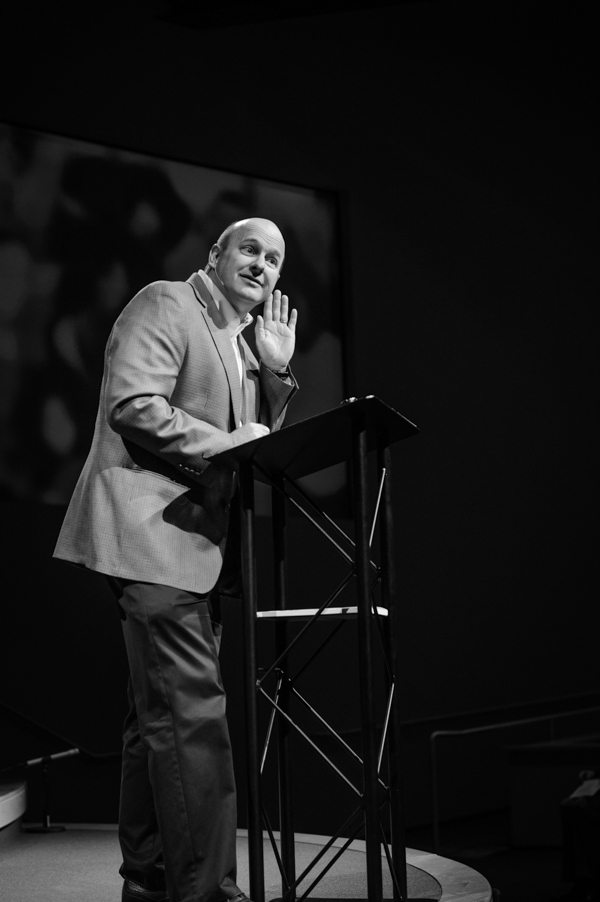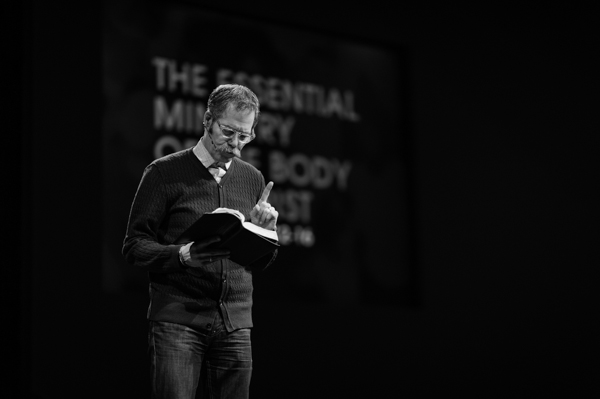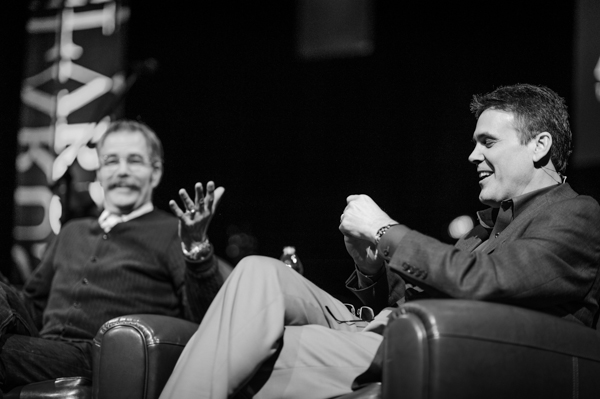Archive for 2013
Mar 13
Songs from Clarus ’13
Clarus ’13 was a great time of worship through the preaching, teaching, and singing of God’s Word. As promised, here are the songs from this years conference with links to chord charts and audio where available. We hope you are encouraged by these songs of grace in your own life and the life of your church.
Saturday Morning:
Saturday Afternoon:
Mar 10
Sunday Recap: Tripp, “The Difference Between Amazement and Faithâ€
Editor’s Note: Tim Ragsdale is Pastor for Local Missions at Desert Springs Church in Albuquerque, NM. This post is a summary of Paul Tripp’s message from Sunday morning at Clarus, March 10, from Mark 6:45-52.
•••••
“God will take us where we have not intended to go in order to produce in us what we could not achieve on our own. That is grace.”
After a weekend of substantive teaching on the practice of every-believer personal ministry and its critical role of in God’s sanctifying work in the community of believers, Dr. Tripp drew the focus clearly back on the source of our hope and object of our faith—King Jesus.
Faith does not come naturally. On the other hand fear, doubt, envy, etc. are all quite natural to us. How does God transform his disciples into people of faith? Jesus extends grace.  It isn’t always the kind of grace that brings immediate relief or jubilation, but instead it is often an uncomfortable grace. The typical way that Jesus would teach his disciples is by putting them in a moment of difficulty where there was some circumstance or need that was beyond their ability. Just when they were coming to a point of confusion or despair, He would reveal His glory—the glory of His power, the glory of His compassion, the glory of His grace. It was that combination of difficulty and glory that was meant to change them. They weren’t just to be informed; they were to be transformed by His grace. Dr. Tripp explained the gospel equation found throughout Mark’s gospel: “Divine Power + Divine Compassion = Everything you need”
And when evening came, the boat was out on the sea, and he was alone on the land. And he saw that they were making headway painfully, for the wind was against them. And about the fourth watch of the night he came to them, walking on the sea. Â (Mark 6:47-48a)
In context we know that this occurs immediately after Jesus’ miraculous feeding of the five thousand. As he walked on the water toward the disciples, he was yet again revealing himself as Lord over creation—God incarnate. And although they were again witnessing his majesty and glory, he knew his disciples were prone to fear and doubt.
He meant to pass by them, but when they saw him walking on the sea they thought it was a ghost, and cried out, for they all saw him and were terrified. But immediately he spoke to them and said, “Take heart; it is I. Do not be afraid.  And he got into the boat with them, and the wind ceased. And they were utterly astounded, for they did not understand about the loaves, but their hearts were hardened.  (Mark 5:48b-52)
He was not there to relieve the men from their difficulties but was there to redeem them in their circumstances. Those in the boat were completely unprepared for this moment. They had hardened hearts and a lack of understanding of the very things they had seen. Yet the Lord Jesus graciously moved towards them with compassion and assured them that ” I AM” was there with them.
Members and attenders of Desert Springs Church have often been encouraged to preach to themselves. Dr. Tripp asks an important question:  What is the gospel that you preach to yourself?  Is it powerless? In times of stress and difficulty do we, like his disciples in the boat forget who we are (and who is with us!) in Christ?  Are we identity amnesiacs?  What identity do we assign ourselves?  Do we remember that I AM is with us just as David the shepherd boy did when he faced the champion of the Philistines and trusted God to deliver him?
Your servant has struck down both lions and bears, and this uncircumcised Philistine shall be like one of them, for he has defied the armies of the living God. Â (1 Samuel 17:36)
When you are faced with various difficult situations, remember that I AM is with you in those moments.  Know that it is by God’s uncomfortable grace that we are being transformed.  “Sometimes you need the storm in order to see the glory.â€
Mar 9
Session 6 Recap: Tripp and Lane, Panel Discussion
Editor’s Note: Nathan Sherman is Minister to Youth and Families at Desert Springs Church in Albuquerque, NM. This post is a summary of the Panel Discussion with Paul Tripp and Timothy Lane on Saturday afternoon at Clarus, March 9.
•••••
Following an extraordinary weekend, the Clarus conference enjoyed a panel Question and Answer time with Dr. Lane and Dr. Tripp.
Recapping the conference, Dr. Lane explained that we are really just talking about interpersonal ministry. We aren’t trying to do wacky things and uncomfortably force Jesus into relationships. We are simply talking about a raised-level of shared-life and fellowship.
Dr. Tripp agreed that living in this kind of authentic, gospel-community is the biblical definition of friendship—this is what God calls us to. Typically what we call friendship is not at all what God calls friendship. Our ultimate example is Jesus, a friend of sinners. Dr. Tripp uses this question to diagnose where he puts his energy: What set of values determines how I spend my time? Often the American dream dictates a schedule that gets so busy that we have little time for relationships. This must be challenged.
Question: What’s the relationship of our interpersonal relationships with church?
Dr. Tripp: Preaching is the formative direction of the church. Interpersonal ministry takes this formative direction and adds correction; it takes the general foundation and gives specificity. Church membership is a localized and concrete way that we give ourselves to God’s Kingdom—giving ourselves to the work of the church, while submitting ourselves to the leadership and the ministry of the church. There is a critical difference in attending a church and giving myself to the ministry of the church.
Dr. Lane: The church is where you are brought into covenantal relationships. We commit to a body of believers, whether we like every particular detail or not. The sacraments are fundamental—we are baptized into a body of believers, and we must recognize the horizontal element of the Lord’s Supper – forgiveness and reconciliation with others.
Question: How are the “one-anothers†practically played out within the church?
Dr. Tripp: Everyone in the church (elders, staff, leaders, members) must be able to teach, preach, admonish, and counsel. We call everyone into commitment to these “one-anothersâ€. Then we train our people to do these better. We need to raise the bar for potential gospel-counsel opportunities. We ought to be concerned about those thousands of conversations that happen every week, which will either benefit or harm others. We set life-long trajectories of individuals, families, and churches in these small, daily conversations.
Question: Is it possible to be too introspective and suspicious of ourselves?
Dr. Lane: It is certainly possible of becoming a morbid introspectionist. After we look inward, we must be moved outward toward Christ and his grace, but then outward in new ways toward others. If these outward trajectories are not present, it’s likely you are dangerously introspective.
Dr. Tripp: – In all other human cultures, my well-being is dependent on my performance. But as a Christian, my well-being is not dependent on if I measure up, but that Christ already measured up. If I keep beating myself up, I’m rejecting the sacrifice of Christ. I am essentially back to a works-righteousness religion, and this is dishonoring to God.
Question: Is there a point to end speaking into another’s life when you only receive manipulation and meanness. Is there a point where Proverbs 26:4 (“Do not answer a fool in his follyâ€) applies?
Dr. Tripp: Yes. There must be a point where you must realize you’ve done everything you can do. Once you go past this point, you are taking on God’s job to change the person. You have become a person-mechanic rather than an ambassador of his grace. This doesn’t mean that you give up—you trust the power of Almighty God.
Dr. Lane: Just like parenting teens, wisdom dictates that you pick your spots well. One of the wisest and most godly things you can do as a parent is to keep your mouth closed and not see every moment of your child’s life as an opportunity to interject your opinion.
Mar 9
Session 5 Recap: Lane, “Practicing Forgiveness: What to Do When You Failâ€
Editor’s Note: Tim Bradley is Pastor for Biblical Counseling and Family Ministry at Desert Springs Church in Albuquerque, NM. This post is a summary of Timothy Lane’s message from Saturday afternoon at Clarus, March 9, “Practicing Forgiveness: What to Do When You Fail,†from Matthew 18:21-35.
•••••
In Dr. Timothy Lane’s final message at Clarus 2013, he spoke about the importance of practicing forgiveness in our relationships. He stated that while it is critically important to the health of our relationships, and an essential part of our faith in Christ, it is one of the least practiced things we do. Dr. Lane states, “We think we do it, but we don’t.”
Dr. Lane opened his message by asking, “Is there any hope when we fail?” And then answering with an emphatic “Yes!” he said our hope in the midst of our failures in that we know and embody the grace that we have received in Christ. In other words, it is our knowing the grace and forgiveness of God, and then extending this same grace and forgiveness to others who have sinned against us. This practice of forgiving others, states Dr. Lane, is not something reserved for the extraordinary, unusual and infrequent moments of life only, but rather something that is to be practiced daily.
After introducing us to the subject of practicing forgiveness, Dr. Lane suggests nine important truths from the parable of the Unforgiving Servant (Matthew 18:21-35).
- What exactly is forgiveness? It is not just canceling the debt, but is absorbing the cost of the debt yourself. The Master in the parable absorbs the debt of the first servant. God absorbs our debt as Jesus suffers and dies for our sin, and we practice biblical forgiveness by canceling and absorbing the debt of another when they sin against us.
- Failure to forgive is when we make them pay. The first servant in the parable, who had been forgiven his debt by the Master, requires that the second servant pay the debt he owed. The first servant failed to forgive the second servant, and we fail to forgive when we make others pay for their sins against us rather than showing mercy.
- Forgiveness is an event and an ongoing process. Truly forgiving another is difficult, yet we must forgive as we’ve been forgiven, and keep on forgiving in our hearts, attitudes and actions.
- Failure to forgive turns victims into victimizers. This is clearly seen when the first servant, who was owed a debt by the second servant, fails to forgive, and then literally begins to choke him. We will become victimizers if we fail to forgive.
- Forgiveness is not peace at all costs. Here we back up in Matthew 18 to verse 15, and see that where sin persists, confrontation and discipline is right, God-honoring, and loving.
- Forgiving others is costly. It cost the Master much (ten thousand talents) to forgive the first servant, and it would have cost the first servant much (one hundred denarii) to forgive the second servant. It will cost us much to practice forgiveness.
- Forgiveness is first vertical, and then horizontal. Practicing forgiveness begins with our vertical relationship with God who forgives our sin. Practicing forgiveness continues when those who have been forgiven by God forgive another who has sinned against them.
- Forgiveness is not forgetting. The term “remembering” found in Jeremiah 31:34 is a covenant promise word, not a memory word. God is omniscient, so He doesn’t have any memory malfunctions. God promises to not treat us according to what our sins deserve, and in this sense He “remembers our sins no more.” We are to forgive like God has forgiven us, so we are to make a covenant promise to not treat another according to what they deserve, but we don’t always forget.
- The way we ask for and grant forgiveness is crucial. Simply saying, “I’m sorry” without asking for forgiveness when we have sinned against another diminishes our sin and the other person, and does not glorify God. Saying, “It’s ok” when another person has sinned against you and then apologized tells them it is ok for them to sin. When we sin against another, we need to acknowledge our sin, ask them for forgiveness, and repent. When we are sinned against, and forgiveness is sought, and repentance pursued, then we are to grant forgiveness – make the promises to not use it against them, not talk to others about their sin, and not dwell on it.
Dr. Lane concluded by asking the very practical and important question, “Why don’t we forgive?” He answers first by stating we don’t forgive because we really don’t think we need to be forgiven. We don’t truly know the forgiveness of God, nor believe we need it, and therefore we don’t forgive. Next he says we don’t forgive because we don’t think we’re forgivable. Either in pride, we can’t accept God’s forgiveness, or in shame we don’t remember and receive God’s forgiveness. We essentially forget the grace, love and forgiveness of God, so we fail to forgive others. Finally, Dr. Lane states that we don’t forgive because the utter amazement and shock of the gospel has waned within our hearts. Amazing Grace, is not so amazing to us…we have forgotten. He sums it up by saying, “If you’re not experiencing God’s monsoon of grace, then grace won’t flow out!”
May we be transformed by the amazing grace and forgiveness of God into those who practice the grace and forgiveness we have so richly received!









